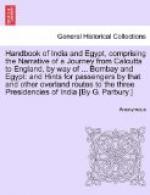So they passed down Ripon Road towards the heart of the City. Followed a couple of Muhammadan Kasais driving a small flock of sheep, dyed pink and blue in patches, which they urged forward in approved Native fashion by driving the fingers into the base of the hindmost animal’s spine; and after them wandered a Syed in a faded green silk robe and cap, carrying the inevitable peacock feather brush, which plays so large a part in exorcism and divination. Later in the day a Hindu lady-doctor hurried past on her way home, and four youths of the student-class, who had left their legal studies in the Fort to see what was toward in the northern portion of the Island. A Municipal sweeper lurched across the open and proceeded to spend twenty minutes in brushing the grating of a drain, leaving the accumulated filth of the adjoining gutter to fester and pollute the surroundings; and two elderly cooly-women, each carrying a phenomenal head-load of dung-cakes, becoming suddenly aware of the presence of troops and thereby struck with terror, collided violently with one another and shot the entire contents of their baskets on to the road. This caused some amusement to the passers-by, particularly to a Pathan who had just taken a very complete bath under one of the taps of the memorial fountain, but the trouble was soon mended by a small boy who, bribed by the offer of one dung cake, helped the old ladies to repack their burdens and replace them on their heads. Next came a swarthy gentleman from Palanpur, who said he was a hawker of glass sugar-bowls, and produced one bowl without a top as proof of his profession. He struck me as being uncommonly and perhaps designedly vacant in speech and appearance, and seemed to have no stock of glassware whatever. I am still wondering whether that topless bowl was really his own or whether he may not have filched it from some convenient dispense-khana.
Meanwhile the Irani at the corner where the trams halt did a roaring trade. He must have boiled his tea-leaves four and five times over in order to supply the constant demands for “adha kop chha-a,” preferred by casual visitors who had come up out of the City to see what was going on. Memons, Bohras, Khojas, Jews, Eurasians and Europeans all patronized his shop during the days of tumult, and the amount of soda-water, “pick-me-up” and raspberryade which was consumed was phenomenal. It was as good as a play to watch the constant stream of people who came out to have a look at the soldiers and to hear their remarks on the situation. “I have heard,” one of them would begin,—and then followed a string of the wildest bazaar-rumours, interspersed with many a “tobah” (fie) “iman-se” (honestly or truly) or “mag kai” (what happened next), which apparently produced such a hunger and thirst that the Irani, thanking his stars for the outbreak of disorder, had to ransack all his cases for comestibles, aerated waters and tea. They sat in deep attention when Motor Car




